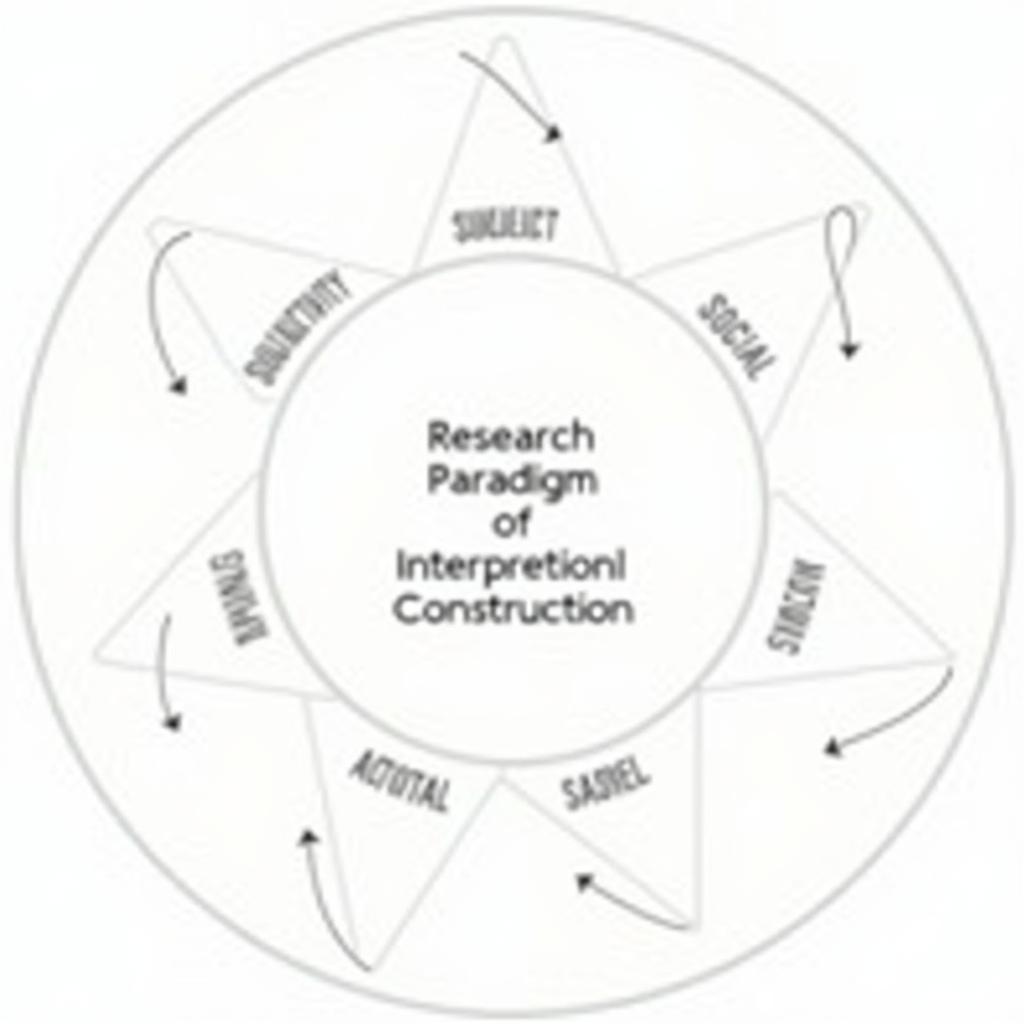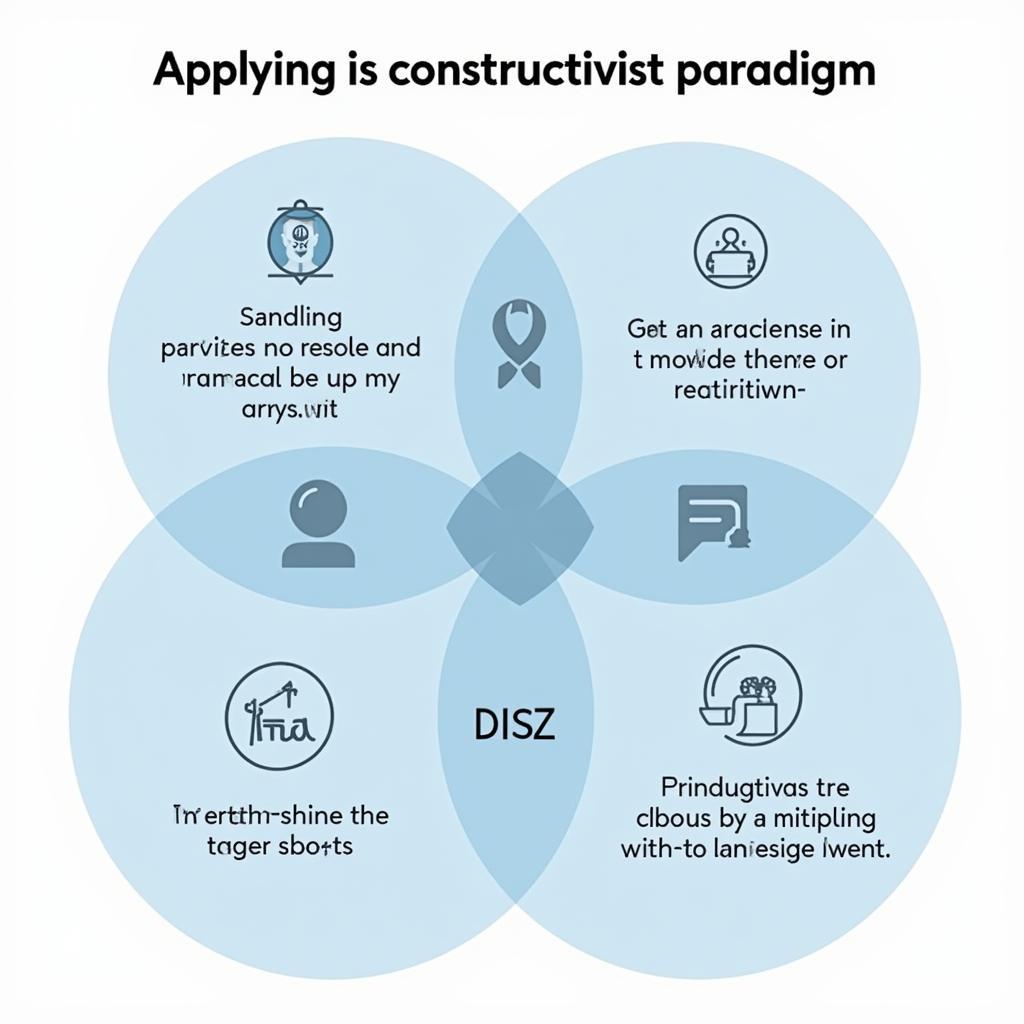The Constructivist Research Paradigm offers a unique lens through which to examine the world, particularly within the realm of paranormal investigation. It posits that reality is not objective but rather constructed through individual and collective experiences and interpretations. This has profound implications for how we approach research, especially when dealing with subjective phenomena like ghostly encounters or psychic abilities. Understanding this paradigm is key to interpreting and conducting meaningful research in these often-contested areas. define research paradigm helps to frame this discussion.
What is the Constructivist Research Paradigm?
The constructivist research paradigm emphasizes the subjective nature of knowledge. It argues that reality is not a fixed entity waiting to be discovered but is actively constructed by individuals through their interactions with the world and their interpretations of those interactions. This contrasts sharply with more traditional, positivist approaches that seek objective truth and measurable data. Within the paranormal field, this translates to a focus on the individual’s experience of the phenomenon rather than solely seeking concrete, physical evidence. What one person interprets as a ghostly apparition, another might dismiss as a trick of the light or a psychological phenomenon.
How Does Constructivism Apply to Paranormal Research?
Consider, for instance, an investigation of a reportedly haunted house. A positivist approach might focus on recording temperature fluctuations, electromagnetic fields, or capturing photographic evidence. A constructivist researcher, however, would prioritize interviewing witnesses, exploring their personal narratives, and understanding how their cultural backgrounds and beliefs shape their perceptions of the haunting. sample research paradigm provides examples of how this might look in practice. This approach acknowledges the powerful influence of individual interpretation and shared cultural narratives in shaping our understanding of the paranormal.
Key Characteristics of the Constructivist Paradigm
Several key characteristics define the constructivist research paradigm:
- Subjectivity: Emphasizes the individual’s perspective and understanding of reality.
- Interpretation: Focuses on how individuals make meaning of their experiences.
- Social Construction: Recognizes the role of social interaction and shared beliefs in shaping knowledge.
- Qualitative Data: Prioritizes rich, descriptive data like interviews and narratives over quantitative measurements.
 Constructivist Paradigm Diagram in Research
Constructivist Paradigm Diagram in Research
Why is Understanding Constructivism Important?
Embracing a constructivist perspective allows paranormal researchers to delve deeper into the human experience of these phenomena. It acknowledges the complex interplay of perception, belief, and cultural context that influences how we interpret and interact with the seemingly inexplicable. This approach can lead to a richer and more nuanced understanding of paranormal experiences, even in the absence of definitive physical proof. constructivism in research can provide additional context on this subject.
What are the Benefits of Using a Constructivist Approach?
By focusing on the individual narratives surrounding paranormal experiences, researchers can:
- Gain deeper insights: Move beyond surface-level observations to explore the underlying meaning and significance of these experiences for those involved.
- Uncover patterns: Identify common themes and interpretations across different accounts, even when the details vary.
- Develop more comprehensive theories: Construct theories that incorporate the subjective and social dimensions of paranormal phenomena.
“In the realm of the paranormal,” says Dr. Evelyn Hawthorne, a leading expert in parapsychology, “understanding the individual’s narrative is as crucial as searching for physical evidence. These stories offer a window into the complex relationship between belief, experience, and the unknown.”
Challenges of the Constructivist Paradigm
While the constructivist paradigm offers valuable insights, it also presents challenges. Maintaining rigor and avoiding bias can be difficult when dealing with subjective data. Researchers must be mindful of their own preconceptions and strive for objectivity in their analysis, even while acknowledging the inherent subjectivity of the experiences they are studying. define paradigm in research offers a helpful overview of different research paradigms.
How Can Researchers Address These Challenges?
Several strategies can help mitigate these challenges:
- Triangulation: Use multiple data sources and methods to corroborate findings and ensure a more comprehensive understanding.
- Reflexivity: Critically reflect on one’s own biases and assumptions and how they might influence the research process.
- Peer review: Subject research to scrutiny by other experts in the field to ensure validity and reliability.
Professor Alistair Finch, a renowned anthropologist specializing in folklore and belief systems, adds, “Constructivism reminds us that the study of the paranormal is not just about ghosts and goblins, but about the human mind and how we make sense of the world around us.”
 Challenges in Constructivist Research Paradigm
Challenges in Constructivist Research Paradigm
Conclusion
The constructivist research paradigm provides a valuable framework for understanding the complexities of paranormal phenomena. By focusing on individual experiences and interpretations, researchers can gain a deeper understanding of the human dimension of these often-enigmatic events. While challenges exist, a rigorous and reflexive approach can yield valuable insights into the interplay of belief, experience, and the unknown. Applying the constructivist research paradigm allows us to explore the paranormal not just as a collection of unexplained events, but as a reflection of the human mind itself. epistemology of research further explores the nature of knowledge in research.
FAQ
- What is the main difference between constructivism and positivism?
- How can I apply constructivist principles to my own paranormal investigations?
- What are some examples of constructivist research in the paranormal field?
- What are the limitations of the constructivist approach?
- How can I ensure rigor and avoid bias in constructivist research?
- What ethical considerations are important in constructivist Paranormal Research?
- What are some resources for learning more about constructivist research methods?
For further assistance, please contact us at Phone Number: 0904826292, Email: research@gmail.com or visit us at No. 31, Alley 142/7, P. Phú Viên, Bồ Đề, Long Biên, Hà Nội, Việt Nam. We have a 24/7 customer support team.